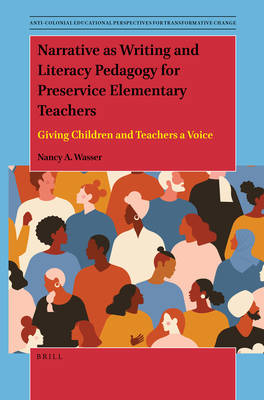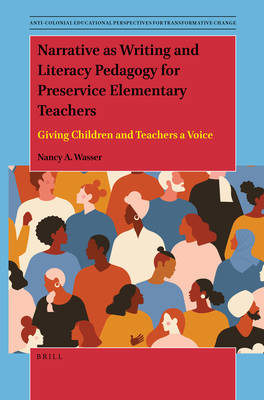
- Afhalen na 1 uur in een winkel met voorraad
- Gratis thuislevering in België vanaf € 30
- Ruim aanbod met 7 miljoen producten
- Afhalen na 1 uur in een winkel met voorraad
- Gratis thuislevering in België vanaf € 30
- Ruim aanbod met 7 miljoen producten
Zoeken
Narrative as Writing and Literacy Pedagogy for Preservice Elementary Teachers
Giving Children and Teachers a Voice
Nancy A Wasser
€ 91,95
+ 183 punten
Uitvoering
Omschrijving
"I just cannot write" or "I am not a good writer" are familiar complaints from students in academia. Many of them claim they cannot express themselves clearly in written text, and their lack of this skill impedes them in their academic career. In this book, Nancy A. Wasser argues that teachers can help solve this when they start viewing writing not as secondary to reading, but as the equally important side of the same coin. Those who cannot read, will not be able to write.
Wasser explains how teaching and regular practicing of writing skills from an early age onwards helps children grow into students who are self-aware of their voices. By employing narrative as a process of learning to write and a way to read, teachers can teach children the art of writing, while also making children more aware of their own constructions of narrative. Combining the focus on individual and group expression in writing lessons, students can trace and reflect on their own life transformations through their writing process.
Good writers are not born that way, but made through effort and practice. Changes in curriculum may not only lead to better-expressed citizens, but also to more balance between teacher and children voices.
Wasser explains how teaching and regular practicing of writing skills from an early age onwards helps children grow into students who are self-aware of their voices. By employing narrative as a process of learning to write and a way to read, teachers can teach children the art of writing, while also making children more aware of their own constructions of narrative. Combining the focus on individual and group expression in writing lessons, students can trace and reflect on their own life transformations through their writing process.
Good writers are not born that way, but made through effort and practice. Changes in curriculum may not only lead to better-expressed citizens, but also to more balance between teacher and children voices.
Specificaties
Betrokkenen
- Auteur(s):
- Uitgeverij:
Inhoud
- Aantal bladzijden:
- 180
- Taal:
- Engels
- Reeks:
- Reeksnummer:
- nr. 11
Eigenschappen
- Productcode (EAN):
- 9789004468504
- Verschijningsdatum:
- 19/08/2021
- Uitvoering:
- Paperback
- Formaat:
- Trade paperback (VS)
- Afmetingen:
- 155 mm x 235 mm
- Gewicht:
- 314 g

Alleen bij Standaard Boekhandel
+ 183 punten op je klantenkaart van Standaard Boekhandel
Beoordelingen
We publiceren alleen reviews die voldoen aan de voorwaarden voor reviews. Bekijk onze voorwaarden voor reviews.











